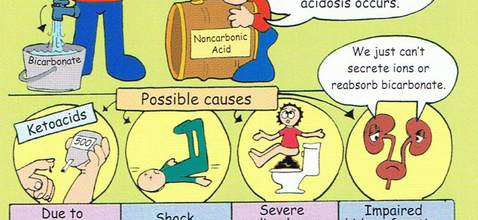Metabolic acidosis
Metabolic acidosis is a condition that occurs when the body produces excessive quantities of acid or when the kidneys are not removing enough acid from the body.Due to increased production of hydrogen ions by the body or the inability of the body to form bicarbonate (HCO3-) in the kidney metabolic acidosis leads to acidemia(blood pH is low (less than 7.35). Its causes are diverse, and its consequences can be serious, including coma and death. Together with respiratory acidosis, it is one of the two general causes of acidemia.Acidosis refers to a process that causes a low pH in blood and tissues. Acidemia refers specifically to a low pH in the blood.
In acute renal failure organic acid retention causes a fall in plasma bicarbonate by 1-2 mEq / L / day. In chronic renal failure acidosis primarily due to inability of the kidneys to form ammonia. Some compensation is achieved by buffering of acid anions by phosphates released from bones. In diarrohoeas like cholera stool bicarbonate loss may be 60 mEq/ L of stool.
Causes of metabolic acidosis
| Normal Anion Gap | Increased Anion Gap | ||
| I | Bicarbonate loss Proximal RTA,diarrhoea,Carbonic anhydrase inhibitorsPrimary hyperparathyroidism. | Reduced renal excretion,Renal, failure, acute and Chronic. | |
| II | Failure of Bicarbonate Regeneration Hypereninemic Hyperaldosteronism Potassium sparing diuretics. | Accumulaiton of Organic acid, Lactic Acidosis, Keto-acidosis diabetic, alcoholic, starvation, infection, salicylates, ethylenglycol, Methanol. | |
| III | Acidifying Salts :Ammonium ChlorideIysine hydrocholoride, agginineHydrocholoride. | Undefined source :Methylmalonic aciduria, Bketolase deficiency. | |
| IV | Latrogenic : Rapid hydration. | ||

Signs and Symptoms of metabolic acidosis
Symptoms are not specific,Symptoms may include chest pain, palpitations, headache, altered mental status such as severe anxiety due to hypoxia, decreased visual acuity, nausea, vomiting, abdominal pain, altered appetite and weight gain, muscle weakness, bone pain and joint pain. Those in metabolic acidosis may exhibit deep, rapid breathing called Kussmaul respirations which is classically associated with diabetic ketoacidosis. Rapid deep breaths increase the amount of carbon dioxide exhaled, thus lowering the serum carbon dioxide levels, resulting in some degree of compensation. Over compensation via respiratory alkalosis to form an alkalemia does not occur.
Extreme acidemia leads to (1)Neurological complications: lethargy, stupor, coma, seizures.
(2) Cardiac complications: arrhythmias (ventricular tachycardia), decreased response to epinephrine; both lead to hypotension (low blood pressure).
Diagnosis of Metabolic acidosis
Decreased pH, decreased plasma bicarbonates and PCO2.
Hyperkalemia, hyperventilation, Kussmauls breathing.
Leukocytosis in absence of infection.
Arterial blood gas sampling is essential for the diagnosis. If the pH is low (under 7.35) and the bicarbonate levels are decreased (<24 mmol/l), metabolic acidemia is present, and metabolic acidosis is presumed. Due to respiratory compensation (hyperventilation), carbon dioxide is decreased and conversely oxygen is increased. An ECG can be useful to anticipate cardiac complications.
Other tests that are relevant in this context are electrolytes (including chloride), glucose, renal function and a full blood count. Urinalysis can reveal acidity (salicylate poisoning) or alkalinity (renal tubular acidosis type I). In addition, it can show ketones in ketoacidosis.
To distinguish between the main types of metabolic acidosis, a clinical tool called the anion gap is considered very useful. It is calculated by subtracting the chloride and bicarbonate levels from the sodium.
Anion gap = ( [Na+]+ [K+]) – ( [Cl – ]+[HCO3- ] )
As sodium is the main extracellular cation, and chloride and bicarbonate are the main anions, the result should reflect the remaining anions. Normally, this concentration is about 8-16 mmol/l (12±4). An elevated anion gap (i.e. > 16 mmol/l) can indicate particular types of metabolic acidosis, particularly certain poisons, lactate acidosis and ketoacidosis.
Differential diagnosis
certain other tests may be necessary, including toxicological screening and imaging of the kidneys. It is also important to differentiate between acidosis-induced hyperventilation and asthma; otherwise, treatment could lead to inappropriate bronchodilation.
When there is a hyperkalemia with acidosis diarrhoea, diabetic ketoacidosis, Renal Tubular Acidosis and acetazolamide toxicity are to be excluded. In hyperchloremic acidosis, the anion gap remains normal.
Treatment of Metabolic acidosis
Treatment depends upon the cause and severity of acidosis.
In acutely ill patients with pH < 7.2, IV bicarbonate infusion is mandatory the total base deficit is calculated from the formula
HCO–3 deficit = 0.4 x kg body weight x (desired HCO–3 – Measured HCO–3)
One half the calculated deficits are replaced in 3-4 hours and the rest over 24 hours. 7.5% NaHCO3 10 ml ampoule contains HCO3 of 44.5 mEq/ampoule. 2-3 ampoules are added to 5% dextrose and infused. Correction of acidosis leads to movement of K+ into the cells, leading to hypokalemia. Hence monitoring of serum K+ is necessary. Acidosis developing in patients on ventilators is fatal as the compensatory hyperventilation is lacking.
In chronic renal failure treatments is indicated only if plasma bicarbonate falls below 15 mEq/L. Oral sodium citrate or bicarbonate 2-4 gm / day (24-48 mEq) usually suffice. Citrate is converted to bicarbonate in the liver. In RTA (Renal Tubular Acidosis) complete correction with oral bicarbonate is required as it then reduces nephrocalcinosis, hypercalciuria and osteomalacia. When there is hypokalemia potassium supplement is essential. Rapid alkalization in harmful because it may precipitate tetany, cardiac arrhythmia and convulsion due to paradoxical CSF acidosis. In diabetic ketoacidosis alkalinisation is necessary only if serum pH is below 7.05 THAM (trihydroxyminomethane) may be indicated use of I.V. sodium bicarbonate. Hypertonic sodium bicarbonate (1mol / L) is the drug of choice for acidosis of cardiac arrest. Shock patients who are volume depleted are best treated with isotonic (0.163 mol / L) sodium bicarbonate.
medlight2u.com
Acne Acne vulgaris Acute Renal Failure Adrenal cortex Angina Angina Pectoris Aortic Regurgitation (AR) Aortic Stenosis (AS) Chest pain Chronic pyelonephritis Coarctation of Aorta Cough cyanosis Cystic acne Dehydration depression Diabetes Mellitus Diagnosis of Aortic Stenosis Dr.KTS DR K TAMILSELVAN Fatigue Heart Failure Hypertension Hypokalemia Hypothyroidism Ischemic Heart Disease LBBB Mitral Incompetence Mitral insufficiency Mitral valve prolapse Nocturia Patent Ductus Arteriosus PDA Polyuria Proteinuria pulmonary hypertension Pulmonary Stenosis ST Depression Symptoms of Acne Syncope Treatment for acne valvular heart disease Ventricular Septal Defect VSD Zits


Leave a Reply